How Much Does It Cost to Move a Trailer House?
Moving a trailer house is a complex and costly process, and understanding the potential expenses involved is essential for homeowners considering this type of relocation. The cost of moving a trailer house can vary widely based on various factors, including the type of move, the size of the mobile home, and additional services required.
When it comes to calculating the cost, there are two main types of moves to consider: transport-only moves and full-service moves. Transport-only moves typically range from $700 to $3,500, depending on the distance and other factors. On the other hand, full-service moves, which include services such as disassembly, transport, and setup, can cost anywhere from $3,000 to $14,000 or more, depending on the size of the mobile home and the complexity of the move.
Additional factors that can affect the cost of moving a trailer house include labor, setup services, moving materials, permits, location, travel distance, local regulations, and various transportation fees. It’s important to factor in these expenses when budgeting for a trailer house move to ensure a smooth and hassle-free relocation.
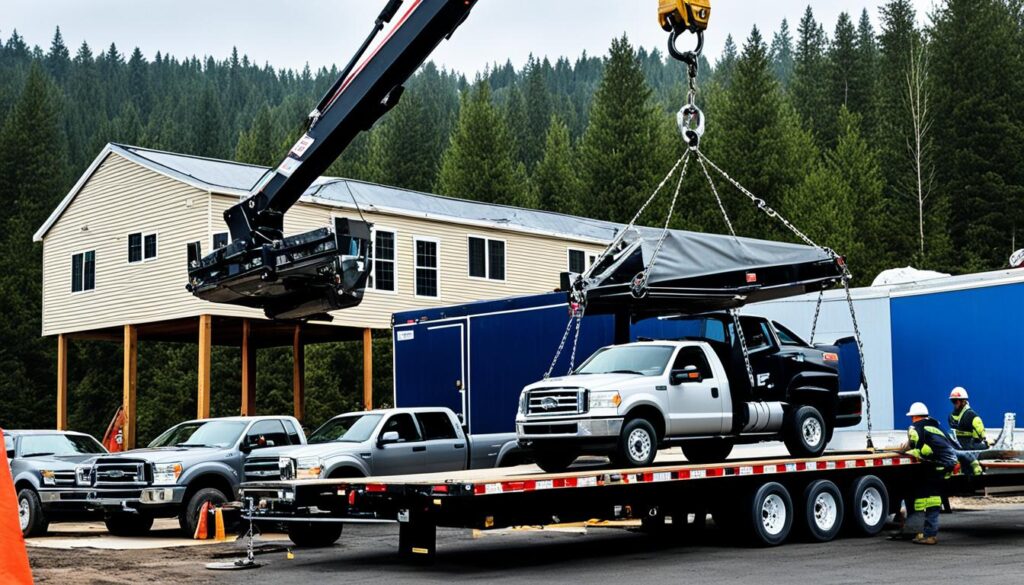
Key Takeaways:
- The cost of moving a trailer house depends on factors such as the type of move and the size of the mobile home.
- Transport-only moves can range from $700 to $3,500, while full-service moves can cost $3,000 to $14,000 or more.
- Additional factors that can affect the cost include labor, setup services, moving materials, permits, location, travel distance, local regulations, and various transportation fees.
- It’s important to consider all these expenses when budgeting for a trailer house move to ensure a smooth and hassle-free relocation.
Factors Affecting the Cost of Moving a Mobile Home
Moving a mobile home involves various factors that can impact the overall cost. To accurately calculate the expenses associated with moving a trailer house, it’s crucial to consider the following factors:
- Distance of the Move: The distance of the move plays a significant role in determining the cost. Generally, longer distances result in higher transportation costs.
- Size and Weight of the Mobile Home: The size and weight of the mobile home are vital factors to consider. Larger and heavier homes require more equipment, such as cranes or specialized trailers, which can increase the cost. Additionally, the size of the home may affect the need for additional permits and escorts.
- Condition of the Mobile Home: The condition of the mobile home can impact the cost. If the home requires repairs or alterations before the move, the expenses will increase accordingly.
- Required Permits and Inspections: Moving a mobile home typically involves obtaining permits and undergoing inspections to ensure compliance with local regulations. These permit fees and inspection costs should be factored into the overall budget.
- Need for Setup Services: Depending on the circumstances, setup services like disconnecting and reconnecting utilities may be required. These additional services can add to the total moving cost.
- Choice of Moving Company: The choice of moving company can also affect the price. Different companies have varying pricing structures and service offerings, so it’s essential to consider multiple quotes and compare them to find the best option for your specific needs.
By carefully considering these factors, homeowners can have a better understanding of the cost associated with moving their mobile home.
| Factors Affecting the Cost of Moving a Mobile Home |
|---|
| Distance of the Move |
| Size and Weight of the Mobile Home |
| Condition of the Mobile Home |
| Required Permits and Inspections |
| Need for Setup Services |
| Choice of Moving Company |
Average Costs for Moving Different Types of Mobile Homes
The cost of moving a mobile home can vary depending on its size and type. On average, a single-wide mobile home can cost between $4,000 and $8,000 for a full-service move within a 60-mile distance. Double-wide mobile homes typically cost between $8,000 and $15,000 for the same move, while triple-wide homes can range from $12,000 to $25,000 or more. These costs include transportation, setup services, permits, and other associated fees.
Moving a single-wide trailer house can be a more affordable option compared to double and triple-wide homes. However, larger homes require more equipment and labor, which contributes to the higher costs. Additionally, the distance of the move and any additional services required may also impact the overall price.
It’s important to consider these average costs when planning a trailer house move and budget accordingly. Obtaining quotes from different moving companies and comparing prices can help ensure you get the best value for your money.
While these cost estimates provide a general range, it’s essential to consult with professional moving companies for accurate and personalized quotes based on your specific mobile home’s characteristics and the details of your move.
Take a look at the table below for a visual breakdown of the average costs for moving different types of mobile homes:
| Mobile Home Type | Average Cost Range |
|---|---|
| Single-Wide | $4,000 – $8,000 |
| Double-Wide | $8,000 – $15,000 |
| Triple-Wide | $12,000 – $25,000+ |
Keep in mind that these figures are estimates and can vary depending on various factors, including the specific details of your move, the location, and the moving company you choose. It is recommended to obtain detailed quotes from reputable movers to get a more accurate cost assessment for your particular mobile home move.
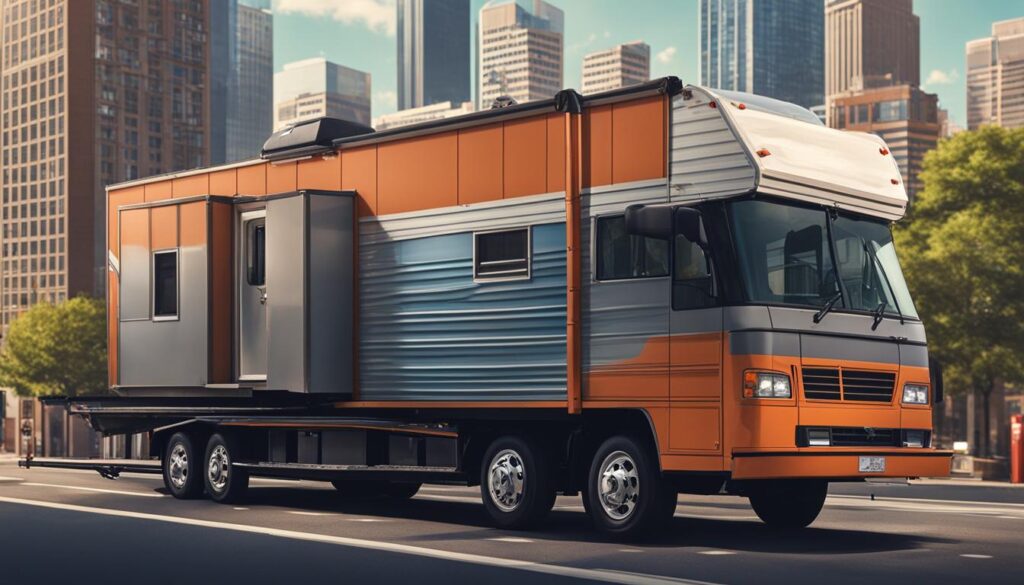
Additional Costs to Consider When Moving a Mobile Home
Moving a mobile home involves more than just the transportation and setup services. There are several additional costs that you should keep in mind when budgeting for a trailer house move. These costs can vary depending on your specific situation and the requirements of your move.
Switching Utilities
When you move a mobile home to a new location, you will need to switch the utilities such as water, electricity, and gas to the new address. This may involve connection fees, setup charges, or even deposits, depending on the utility providers in your area. Be sure to contact the utility companies well in advance to understand the costs and procedures involved in transferring your utilities.
Repairs and Maintenance
Before or after your mobile home move, you may need to perform repairs or maintenance on the home. This can include fixing any structural issues, updating the interior or exterior, or ensuring that the home is in compliance with local building codes. The cost of repairs and maintenance can vary greatly depending on the condition of your mobile home and the extent of the work required.
Permits and Fees
Moving a mobile home often requires permits and inspections from local or state authorities. These permits and fees can vary depending on your location and the size of your home. It’s important to research and understand the necessary permits and fees beforehand to avoid any surprises during the moving process. Consulting with a professional moving company can help ensure that you have all the required permits and that the necessary fees are included in your budget.
Add-Ons and Extra Services
Consider any additional structures or features that may need to be moved along with your mobile home. This could include detached structures like sheds or decks. Moving these add-ons will incur additional costs for transportation and setup. Additionally, if you require extra services such as packing and moving belongings, you should factor in the associated costs.
Taking these additional costs into account when planning your mobile home move will help you avoid any financial surprises and ensure that you have a realistic budget. By working with a reputable moving company that specializes in mobile home moves, you can receive guidance and accurate cost estimates based on your specific requirements.

Next, we’ll explore the benefits of hiring professionals for mobile home moves and how they can simplify the process and provide peace of mind.
Benefits of Hiring Professionals for Mobile Home Moves
While moving a mobile home can be a daunting task, hiring professional mobile home movers can provide many advantages and make the process smoother and more efficient. Here are some key benefits of using a moving company for trailer house moves:
- Experience and Expertise: Professional mobile home movers have the necessary experience and expertise to handle the intricacies of moving a mobile home. They are familiar with the unique challenges that come with transporting and setting up mobile homes, ensuring a safe and successful move.
- Specialized Equipment: Moving a mobile home requires specialized equipment that professional movers have access to. From hydraulic jacks for lifting and leveling to heavy-duty trailers for transportation, these tools enable them to handle the job efficiently and effectively.
- Moving Permits: Obtaining the necessary moving permits can be a complex and time-consuming process. Professional movers have the knowledge and experience to navigate the permit requirements and handle the paperwork, saving homeowners the hassle and ensuring compliance with local regulations.
- Setup Services: Setting up a mobile home at the new location involves various tasks, such as reconnecting utilities, leveling the home, and securing it properly. Professional movers can provide setup services, ensuring that the mobile home is installed correctly and ready for occupancy.
- Save Time and Effort: Moving a mobile home requires significant time and effort. By hiring professionals, homeowners can focus on other important aspects of the move, such as preparing the new location or settling in, while leaving the logistics of the mobile home move in the hands of experts.
- Liability Coverage: Professional movers typically provide liability coverage for the move. This insurance offers homeowners peace of mind, as it protects them against any damage or complications that may arise during the transportation and setup of the mobile home.
By hiring professionals, homeowners can ensure that their mobile home move is handled with care, efficiency, and expertise, reducing the risk of damage or complications. The advantages of hiring professional mobile home movers outweigh the higher cost, and the peace of mind they provide is invaluable.
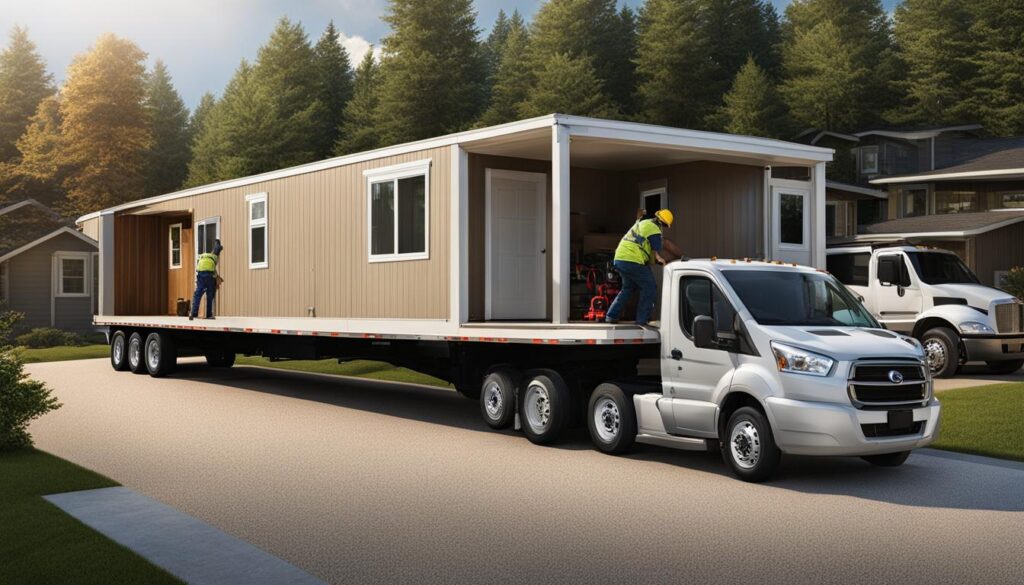
Get a Free Quote Today!
If you are planning a mobile home move, don’t hesitate to reach out to professional movers for a free quote. They can assess your specific needs and provide you with a cost estimate for your trailer house move. Take advantage of their expertise and experience to ensure a successful and stress-free relocation!
Tips for Saving Money When Moving a Mobile Home
Moving a mobile home can be an expensive process, but there are several cost-saving tips you can consider to reduce trailer house moving expenses. By following these strategies, you can save money while ensuring a smooth and efficient move.
1. Declutter and Reduce
Before you start packing, take the opportunity to declutter your mobile home. Set aside items that you no longer need or want and consider donating or selling them. By reducing the number of items you need to move, you can lower the overall cost.
2. Pack and Move Belongings Yourself
One way to save money on hiring professional movers is to handle the packing and moving of your belongings yourself. Enlist the help of family and friends, rent a moving truck, and pack your items carefully to ensure their safe transportation. This can significantly cut down on labor costs.
3. Get Multiple Quotes
When hiring professional movers, it’s essential to get multiple quotes from different companies. By comparing prices and services offered, you can find the best deal that fits your budget. Take into account factors such as experience, reputation, and customer reviews when making your decision.
4. Complete Pre-Move Repairs and Maintenance
Before the moving day, take the time to inspect your mobile home and complete any necessary repairs and maintenance tasks yourself. This can include fixing minor plumbing issues, replacing broken fixtures, or patching up damaged areas. By doing these tasks independently, you can save on additional service fees.
5. Consider Off-Season Moves
Another way to save money when moving a mobile home is to consider off-season moves or choose less popular moving times. Moving companies tend to have lower rates during non-peak periods, making it an opportune time to schedule your move. Additionally, moving during the weekdays instead of weekends can also result in lower costs.
| Tips for Saving Money When Moving a Mobile Home |
|---|
| Declutter and Reduce |
| Pack and Move Belongings Yourself |
| Get Multiple Quotes |
| Complete Pre-Move Repairs and Maintenance |
| Consider Off-Season Moves |
By following these tips, you can significantly reduce your trailer house moving expenses and make the relocation process more affordable. Remember to plan ahead, compare prices, and take advantage of cost-saving opportunities to ensure a smooth and budget-friendly move.

Considerations for Deciding When to Move a Mobile Home
Deciding when to move a mobile home involves careful consideration of various factors. It’s important to take into account personal preferences, lifestyle choices, and external circumstances when determining the right time for a trailer house move.
One common reason for moving a mobile home is due to relocation. Whether you’re moving to a new city or state for work, family, or other reasons, transporting your mobile home allows you to maintain the comfort and familiarity of your living space in a new location.
Another consideration is the closure of a mobile home park. If the park is closing or transitioning to a different land use, you will need to move your mobile home to a new location. This requires careful planning and coordination with the park management and local authorities.
Land development can also be a factor that necessitates moving your mobile home. If the property where your mobile home is currently located is being developed for a different purpose, you may need to find a new site for your home.
Selling an old mobile home and purchasing a new one is another reason to consider a move. Whether you’re upgrading to a larger home or downsizing to a smaller one, moving your mobile home allows you to make a smooth transition between residences.
When contemplating a mobile home move, it’s crucial to consider the legal requirements, permits, and inspections involved. Each municipality and state may have specific regulations and guidelines that must be followed. Ensuring compliance with these requirements is essential to avoid any complications during the move.
By carefully weighing these factors and giving thoughtful consideration to your specific circumstances, you can determine the right time for a trailer house move that aligns with your needs and goals.
Insert an image related to mobile home moving
| Factors to Consider | Description |
|---|---|
| Relocation | Moving to a new city or state for personal or professional reasons. |
| Closure of a Mobile Home Park | If the park is closing or transitioning to a different land use, moving your mobile home becomes necessary. |
| Land Development | When the property where your mobile home is located is being developed for a different purpose. |
| Buying/Selling a Mobile Home | Upgrading to a larger home or downsizing to a smaller one may require a move. |
| Legal Requirements and Permits | Understanding and complying with the legal requirements, permits, and inspections for a mobile home move. |
Options for Moving a Mobile Home
When it comes to moving a mobile home, you have several options to consider. Each option has its own benefits and drawbacks, depending on factors such as distance, size, and your level of expertise. Here are the main options for moving a mobile home:
- Hiring professional mobile home movers: This is often the recommended option, especially for long distance moves or larger mobile homes. Professional movers have the necessary equipment and expertise to handle the entire process, from transport to disassembly and setup. They can also take care of permits and ensure the move complies with local regulations.
- Towing services: If your mobile home is small enough and you’re only moving a short distance, towing services can be a cost-effective option. These services can handle the transportation of your mobile home, but you will need to handle the disassembly and setup yourself.
- DIY moves: If you have the necessary equipment and knowledge, you can choose to move the mobile home yourself. This option is more suitable for smaller mobile homes and shorter distances. However, keep in mind that long-distance moves may require specialized equipment, and you will need to secure the necessary permits and comply with local regulations.
- Mobile home transport companies: These companies offer a middle-ground solution, providing transportation services for your mobile home while still allowing you to manage certain aspects of the move. This option can be suitable if you want more control over the process but still need professional assistance with the transportation.
Comparing Move Options
| Move Option | Benefits | Drawbacks |
|---|---|---|
| Hiring professional mobile home movers | – Expertise and equipment – Full-service handling – Compliance with regulations and permits |
– Higher cost – Less control over the process |
| Towing services | – Cost-effective for short distances – Handles transportation |
– Requires DIY disassembly and setup – Limited to small mobile homes |
| DIY moves | – Potential cost savings – More control over the process |
– Requires equipment and knowledge – Permits and regulations compliance |
| Mobile home transport companies | – Professional transportation services – Partial control over the process |
– May still require permits and regulations compliance |
Consider your specific needs, budget, and level of involvement when choosing the right move method for your mobile home. Assess which option aligns best with your requirements and ensures a safe and successful move.
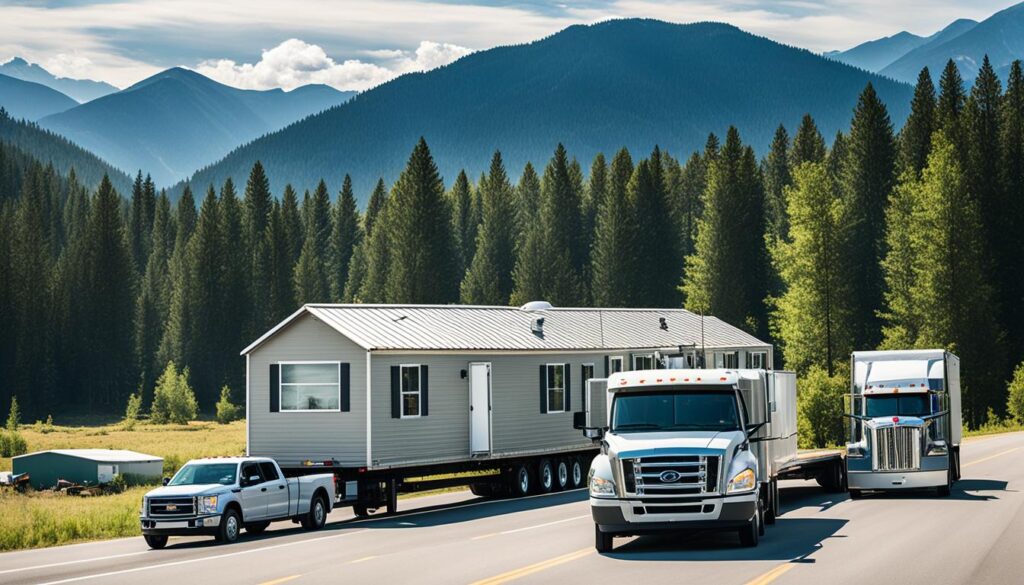
Legal and Administrative Considerations for Moving a Mobile Home
Moving a mobile home involves important legal and administrative considerations to ensure a smooth and compliant relocation process. To avoid any complications, it’s crucial for homeowners to adhere to the legal requirements and follow the necessary administrative steps. This section highlights the key aspects that need to be addressed when moving a mobile home.
Obtaining the Required Permits and Documentation
Before moving a mobile home, homeowners must obtain the necessary permits and documentation from both local and state authorities. These permits ensure that the relocation is conducted in compliance with the applicable regulations and zoning laws. Failing to secure the required permits can result in legal penalties and delays in the move. It’s important to research the specific permit requirements for the origin and destination locations to ensure a hassle-free transition.
Complying with Building Codes and Regulations
When relocating a mobile home, it’s essential to comply with the building codes and regulations of the new location. This includes verifying that the mobile home meets all safety standards and local requirements for placement, foundation, and utility connections. Adhering to these codes ensures that the mobile home is legally and safely situated in its new environment.
Addressing Tax and Insurance Matters
Prior to the move, homeowners should take care of any tax and insurance-related considerations. This may include notifying relevant tax authorities of the change in address and ensuring that the mobile home is adequately insured during the relocation process. It’s advisable to consult with tax professionals and insurance agents to accurately assess the impact of the move on taxes and insurance coverage.
Working with Licensed and Reputable Moving Companies
To navigate the legal and administrative requirements seamlessly, it’s highly recommended to engage the services of licensed and reputable moving companies. These professionals are well-versed in the rules and regulations governing mobile home relocations and can provide expert guidance throughout the process. By collaborating with experienced movers, homeowners can ensure compliance with legal obligations and streamline the administrative aspects of the move.
Remember, navigating the legal and administrative considerations is crucial when moving a mobile home. Securing the required permits, complying with building codes, addressing tax and insurance matters, and working with reputable moving companies are essential steps for a successful and compliant mobile home relocation.
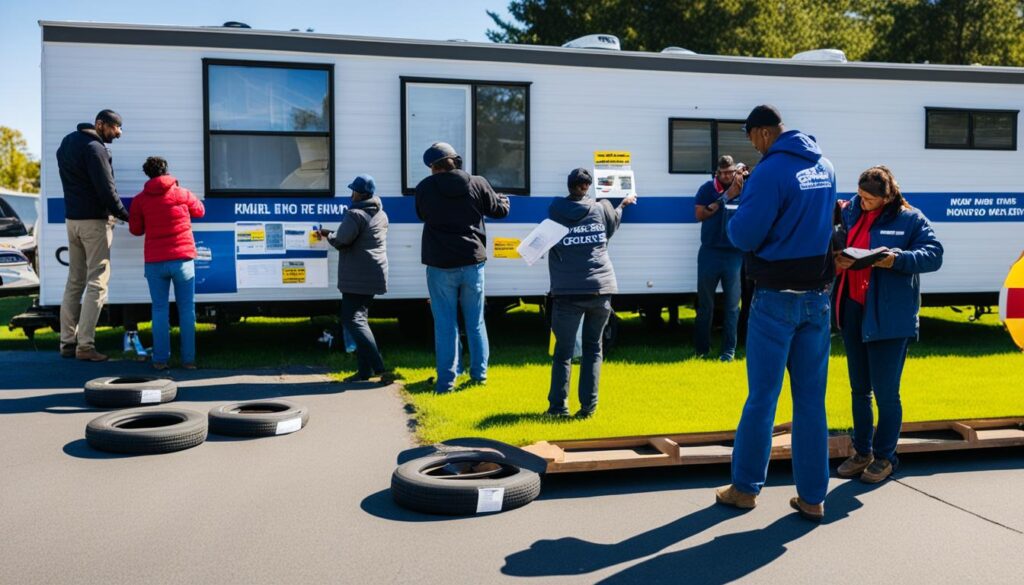
| Legal and Administrative Considerations for Moving a Mobile Home |
|---|
| Obtaining the required permits and documentation |
| Complying with building codes and regulations |
| Addressing tax and insurance matters |
| Working with licensed and reputable moving companies |
Frequently Asked Questions about Moving a Mobile Home
Many homeowners have questions when it comes to moving a mobile home. Here are some of the most commonly asked questions:
-
Is it legal to move a mobile home yourself?
Moving a mobile home yourself is generally not recommended. It requires specialized equipment, permits, and knowledge of local regulations. Hiring professionals ensures a safer and more efficient move.
-
Is it worth it to move a mobile home?
Whether it’s worth it to move a mobile home depends on the situation. If the home is in good condition, relocating it can be a cost-effective option compared to buying a new one. However, factors such as distance, moving costs, and the condition of the current site should be considered.
-
Are permits required for moving a mobile home?
Permits are usually required for moving a mobile home. These permits ensure that the move complies with local regulations and safety standards. It’s important to check with local authorities to obtain the necessary permits before the move.
-
What insurance coverage is needed for a mobile home move?
Insurance coverage for a mobile home move can vary. Some moving companies provide liability coverage for the transportation, while others may offer additional insurance options. It’s important to discuss insurance coverage with the chosen moving company to ensure adequate protection during the move.
-
How can I save money on a mobile home move?
There are several ways to save money on a mobile home move. Decluttering and reducing the number of items to be moved can lower the overall cost. Packing and moving belongings yourself can also save money on hiring movers. Getting multiple quotes from different moving companies and comparing prices can help find the best deal. Completing pre-move repairs and maintenance on the mobile home yourself can also save on additional service fees.
-
What types of services do moving companies offer for mobile home moves?
Moving companies offer a range of services for mobile home moves. These can include transportation, disassembly, setup, permits handling, and packing and unpacking services. It’s important to discuss the specific needs and services required with the chosen moving company beforehand.
Having a clear understanding of these frequently asked questions can help homeowners navigate the process of moving a mobile home more confidently and successfully.
Summary and Final Thoughts on Moving a Mobile Home
Moving a mobile home can be an intricate and costly process. The total cost is influenced by several factors, including the distance of the move, the size and weight of the mobile home, its condition, required permits, and the choice of moving company. It’s crucial to consider all additional expenses, such as utilities, repairs, and permits, when planning the budget for relocating a mobile home.
Although the cost may seem high, hiring professionals for the job offers numerous advantages. These experts have the experience, knowledge, and equipment necessary to ensure a secure and efficient move. They can handle permits and provide liability coverage, which gives homeowners peace of mind throughout the process.
To save money, homeowners can implement various cost-saving tips. Decluttering and reducing the number of items to be moved can significantly decrease the overall cost. Obtaining multiple quotes from different moving companies and comparing prices is another effective strategy. Completing any necessary repairs and maintenance on the mobile home beforehand can also save on additional service fees.
Additionally, it’s crucial to consider the legal and administrative requirements associated with relocating a mobile home. Homeowners must obtain the required permits and comply with building codes and regulations at the new location. Working with a licensed and reputable moving company can help navigate these legal considerations and ensure a smooth and successful move.
FAQ
How much does it cost to move a trailer house?
The cost of moving a trailer house can vary depending on factors such as the type of move and the size of the mobile home. Transport-only moves can range from 0 to ,500, while full-service moves can cost ,000 to ,000 or more.
What factors affect the cost of moving a mobile home?
The cost of moving a mobile home is influenced by factors such as the distance of the move, the size and weight of the home, its condition, required permits and inspections, the need for setup services, and the choice of moving company.
What are the average costs for moving different types of mobile homes?
On average, a single-wide mobile home can cost between ,000 and ,000 for a full-service move within a 60-mile distance. Double-wide mobile homes typically cost between ,000 and ,000 for the same move, while triple-wide homes can range from ,000 to ,000 or more.
What additional costs should be considered when moving a mobile home?
In addition to transportation and setup services, there are additional costs to consider such as utilities, repairs or maintenance on the mobile home, permits and fees, and potential add-ons or extra services.
What are the benefits of hiring professionals for mobile home moves?
Hiring professionals ensures that the move is handled safely and efficiently. They have the expertise, equipment, and permits to handle the intricacies of moving a mobile home. They also provide liability coverage and save homeowners time and effort.
What tips can help save money when moving a mobile home?
Tips for saving money when moving a mobile home include decluttering to reduce the number of items to be moved, packing and moving belongings yourself, getting multiple quotes from different moving companies, completing pre-move repairs, and considering off-season moves or less popular moving times.
What should be considered when deciding when to move a mobile home?
Factors to consider when deciding when to move a mobile home include personal preferences, lifestyle choices, external circumstances such as closure of a mobile home park or land development, selling an old mobile home and purchasing a new one, legal requirements, permits, and inspections.
What are the options for moving a mobile home?
Options for moving a mobile home include hiring professional mobile home movers who handle transport, disassembly, setup, and permits, using towing services for short-distance moves, DIY moves for those with the necessary equipment and knowledge, and mobile home transport companies that offer transportation services.
What legal and administrative considerations are involved in moving a mobile home?
Legal and administrative considerations for moving a mobile home include obtaining permits and documentation, complying with building codes and regulations, taking care of tax and insurance-related matters, and working with licensed and reputable moving companies.
What are some frequently asked questions about moving a mobile home?
Common FAQs about moving a mobile home include whether it’s legal to move a mobile home yourself, whether it’s worth it to move a mobile home, whether permits are required for the move, insurance coverage, cost-saving tips, and the types of services offered by moving companies.
What are the summary and final thoughts on moving a mobile home?
Moving a mobile home can be complex and expensive, but with proper planning and consideration, it can be done efficiently and economically. The cost depends on various factors, and it’s important to factor in all additional costs. Hiring professionals offers benefits such as expertise and liability coverage. By following cost-saving tips and considering legal and administrative requirements, homeowners can make the process smoother.






